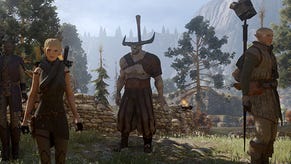Hmm: EA On Steam/Origin Mega-Sales
Having been doing an awful lot of dev interviews for this site and others over the last couple of years, I've become increasingly wary of the out of context quote. Not because I believe they're inaccurate (at least, not usually), because if you say something you should damn well be prepared to stand by it, but because picking out key words or phrases creates a wholly new context. That is, a man stands on top of a building with a megaphone and unexpectedly bellows a forceful proclamation at the world. That's never how it happens, even in those rare interviews where the subject goes into it with an intention to push a specific agenda. While their opinions are their opinions, the contentious statements that become headlines almost always form part of a larger, calmer conversation where they're led onto certain topics.
Hence, EA's Origin boss David DeMartini saying Steam's mega-sales "cheapen intellectual property" did not involve DeMartini leaning in close to the journalist at GamesIndustry International, raising a clenched fist with fire in his eyes, spittle on his lips and an expression which suggested he hoped everyone at Valve would spontaneously combust. Instead, as you can see if take the time to read the full interview rather than have an immediate reaction to that quote on its own, he offered a considered answer in response to a very specific question, which was itself part of a wider-ranging chat.
So, with apologies to GI for quoting quite so much of their thoughtful interview, here's the fuller quote.
"We [Origin] won't be doing that [deep-discounting in sales]. Obviously they think it's the right thing to do after a certain amount of time. I just think it cheapens your intellectual property. I know both sides of it, I understand it. If you want to sell a whole bunch of units, that is certainly a way to do that, to sell a whole bunch of stuff at a low price. The gamemakers work incredibly hard to make this intellectual property, and we're not trying to be Target. We're trying to be Nordstrom. When I say that, I mean good value - we're trying to give you a fair price point, and occasionally there will be things that are on sale you could look for a discount, just don't look for 75 percent off going-out-of-business sales."
And, later:
"Without revealing too much, what I'll say is one way to deal with aging inventory is you do deep discounts like that. There are other ways, which I can't really talk about, of dealing with product as it ages over a period of time, where you present a value to the customer and you engage them in your service on a going-forward basis... We've got something else that we do believe in that we'll be rolling out. But I absolutely understand your point, and I'm not not-hearing what you're saying."
I presume initiatives like Battlefield Premium and trickle-updates for stuff like Mass Effect 3 are related to the "something else", but we shall see. Streaming games is another option, I guess, as are 'ultimate editions' that contain the increasingly hard-to-track glut of DLC'n'whatnot they push out for their big titles.
The trouble with DeMartini's comments, for me, is not that he's saying Steam or the publishers that do embrace mega-sales via it are wrong-headed. It's that he's talking about "cheapening intellectual property", and he works for a company that's quite happy to disregard Syndicate or Ultima's heritage/value in favour of chasing the prevailing wind (rote FPS and F2P browser-strategy respectively), to rush out a sub-standard Dragon Age sequel, and to shut down multiplayer servers for games that its staff worked bloody hard to make after just a couple of years. Obviously, that wasn't the subject or context of the question, and DeMartini is talking about the Origin store specifically rather than the publisher as a whole, but it's not news to anyone that EA seems to be by and large more about the big fat cash than offering ultimate respect for its own brands. Everything seems to be monetised and spun-off into whatever avenues are available, be it Facebook, Mountain Dew cans or iOS Apps.
On the other side of the coin, I can't help agree with him somewhat on this point: " Also what Steam does might be teaching the customer that "I might not want it in the first month, but if I look at it in four or five months, I'll get one of those weekend sales and I'll buy it at that time at 75 percent off."
We do see that time and again in RPS comments. Even you've said it, Steve. Yes, it's completely fair enough in this economically-troubled times that anyone would want to save money where they can, especially on what are essentially luxury items. I can't promise I wouldn't do the same. But in an age where studios seem to be getting axed by their bottom line-obsessed overlords every other week, such consumer inertia probably isn't helping. I honestly don't have the foggiest if this problem, it it is indeed a problem, is anywhere near widespread enough as yet to have meaningful repercussions, but it does seem the case that a great many people simply take it for granted that they won't have to wait long to get a videogame they're only partially interested in much cheaper much later. That said, it might be that without the mega-sale many people would simply never buy a game they aren't actively anticipating. What the deep discounting can do is lead people to games they might otherwise never have tried, and between that and the bundles quite a few indie devs have seen life-changing results. As Time Gentlemen, Please dev Dan Marshall observed on Twitter earlier, "Steam sales have enhanced my IP beyond what I ever thought possible."
In conclusion: different companies do different things and that is okay.

















